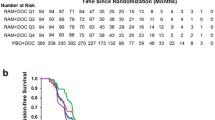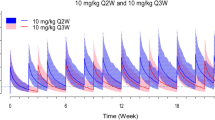Abstract
Purpose
Entrectinib is an anti-cancer agent that inhibits TRKA/B/C, ROS1, and ALK. Secondary pharmacokinetic (PK) exposure parameters for entrectinib derived from a previously described population PK model were used to characterize exposure–response relationships in patients treated with entrectinib.
Methods
Data were pooled from Phase 1 and 2 studies of entrectinib (600–800 mg/day in adults, 250–750 mg/m2/day in children) in 293 patients with NTRK-, ROS1-, or ALK-positive, locally advanced or metastatic tumors. Efficacy was evaluated by the changes in sum of target lesion diameters and best overall response defined by RECIST1.1. A longitudinal nonlinear mixed-effect model described the relationship between entrectinib exposure and tumor size data in patients with ROS1-positive non-small-cell lung cancer (NSCLC) or NTRK fusion-positive solid tumors. The relationship between exposure and treatment-emergent (TEAEs) or serious (SAEs) adverse events was assessed by logistic regression in all patients for whom secondary PK parameter estimates were derived.
Results
Among the 89 patients with evaluable efficacy data included in the exposure-efficacy analysis, 73% (65/89) achieved a complete or partial response. Entrectinib exposure distribution was similar in responders and non-responders. Model-described tumor shrinkage rates were 8–12 times greater than growth rates in both ROS-1-positive NSCLC patients and NTRK fusion-positive solid tumor patients, with no relationship between exposure and these rates. The probability of experiencing a Grade ≥ 3 TEAE or SAE increased with exposure, primarily at doses > 600 mg/day.
Conclusion
These analyses supported that entrectinib at 600 mg/day provides an acceptable benefit–risk ratio in adults with NTRK-, ROS1-, or ALK-positive tumors, considered as rare disease.



Similar content being viewed by others
Availability of data and materials
Qualified researchers may request access to individual patient-level data through the clinical study data request platform (https://vivli.org/). Further details on Roche’s criteria for eligible studies are available here (https://vivli.org/members/ourmembers/). For further details on Roche’s Global Policy on the Sharing of Clinical Information and how to request access to related clinical study documents, see here (https://www.roche.com/research_and_development/who_we_are_how_we_work/clinical_trials/our_commitment_to_data_sharing.htm).
References
Brodeur GM, Minturn JE, Ho R, Simpson AM, Iyer R, Varela CR, Light JE, Kolla V, Evans AE (2009) Trk receptor expression and inhibition in neuroblastomas. Clin Cancer Res 15:3244–3250. https://doi.org/10.1158/1078-0432.CCR-08-1815
Shaw AT, Hsu PP, Awad MM, Engelman JA (2013) Tyrosine kinase gene rearrangements in epithelial malignancies. Nat Rev Cancer 13:772–787. https://doi.org/10.1038/nrc3612
Amatu A, Sartore-Bianchi A, Siena S (2016) NTRK gene fusions as novel targets of cancer therapy across multiple tumour types. ESMO Open 1:e000023. https://doi.org/10.1136/esmoopen-2015-000023
Dogan S, Wang L, Ptashkin RN, Dawson RR, Shah JP, Sherman EJ, Tuttle RM, Fagin JA, Klimstra DS, Katabi N, Ghossein RA (2016) Mammary analog secretory carcinoma of the thyroid gland: a primary thyroid adenocarcinoma harboring ETV6–NTRK3 fusion. Mod Pathol 29:985–995. https://doi.org/10.1038/modpathol.2016.115
Doebele RC, Davis LE, Vaishnavi A et al (2015) An oncogenic NTRK fusion in a patient with soft-tissue sarcoma patient with response to the tropomyosin-related kinase inhibitor LOXO-101. Cancer Discov 5:1049–1057. https://doi.org/10.1158/2159-8290.CD-15-0443
Vaishnavi A, Capelletti M, Le AT et al (2013) Oncogenic and drug sensitive NTRK1 rearrangements in lung cancer. Nat Med 19:1469–1472. https://doi.org/10.1038/nm.3352
Vaishnavi A, Le AT, Doebele RC (2015) TRKing down an old oncogene in a new era of targeted therapy. Cancer Discov 5:25–34. https://doi.org/10.1158/2159-8290.CD-14-0765
Aisner DL, Nguyen TT, Paskulin DD, Le AT, Haney J, Schulte N, Chionh F, Hardingham J, Mariadason J, Tebbutt N, Doebele RC, Weickhardt AJ, Varella-Garcia M (2014) ROS1 and ALK fusions in colorectal cancer, with evidence of intratumoral heterogeneity for molecular drivers. Mol Cancer Res 12:111–118. https://doi.org/10.1158/1541-7786.MCR-13-0479-T
Bergethon K, Shaw AT, Ou SHI et al (2012) ROS1 rearrangements define a unique molecular class of lung cancers. J Clin Oncol 30:863–870. https://doi.org/10.1200/JCO.2011.35.6345
Choi YL, Soda M, Yamashita Y et al (2010) EML4-ALK mutations in lung cancer that confer resistance to ALK inhibitors. N Engl J Med 363:1734–1739. https://doi.org/10.1056/NEJMoa1007478
Khozin S, Blumenthal GM, Zhang L et al (2015) FDA approval: ceritinib for the treatment of metastatic anaplastic lymphoma kinase-positive non-small-cell lung cancer. Clin Cancer Res 21:2436–2439. https://doi.org/10.1158/1078-0432.CCR-14-3157
Malik SM, Maher VE, Bijwaard KE et al (2014) U.S. Food and Drug Administration approval: crizotinib for treatment of advanced or metastatic non-small-cell lung cancer that is anaplastic lymphoma kinase positive. Clin Cancer Res 20:2029–2034. https://doi.org/10.1158/1078-0432.CCR-13-3077
Ou SHI, Ahn JS, De Petris L et al (2016) Alectinib in crizotinib-refractory ALK-rearranged non-small-cell lung cancer: a phase II global study. J Clin Oncol 34:661–668. https://doi.org/10.1200/JCO.2015.63.9443
Shaw AT, Ou SHI, Bang YJ et al (2014) Crizotinib in ROS1-rearranged non-small-cell lung cancer. N Engl J Med 371:1963–1971. https://doi.org/10.1056/NEJMoa1406766
Shaw AT, Gandhi L, Gadgeel S et al (2016) Alectinib in ALK-positive, crizotinib-resistant, non-small-cell lung cancer: a single-group, ulticenter, phase 2 trial. Lancet Oncol 17:234–242. https://doi.org/10.1016/S1470-2045(15)00488-X
Entrectinib package insert (2019) Genentech USA, Inc, a member of the Roche Group. South San Francisco, CA
NDA/BLA Multi-disciplinary Review and Evaluation NDA 212726 (Version date: February 1, 206). https://www.accessdata.fda.gov/drugsatfda_docs/pediatric/451_212726_entrectinib_multidisciplinary_BPCA.pdf
Entrectinib SmPC (2020) Rozlytrek 100 mg hard capsules. EMC. https://www.medicines.org.uk/emc/product/11686/smpc#gref
Drilon A, Siena S, Dziadziuszko R et al (2020) Entrectinib in ROS1 fusion-positive non-small-cell lung cancer: integrated analysis of three phase 1–2 trials. Lancet Oncol 21:261–270. https://doi.org/10.1016/S1470-2045(19)30690-4
Doebele RC, Drilon A, Paz-Ares L et al (2020) Entrectinib in patients with advanced or metastatic NTRK fusion-positive solid tumours: integrated analysis of three phase 1–2 trials. Lancet Oncol 21:271–282. https://doi.org/10.1016/S1470-2045(19)30691-6
Drilon A, Siena S, Ou SHI et al (2017) Safety and antitumor activity of the multi-targeted Pan-TRK, ROS1, and ALK inhibitor entrectinib (RXDX-101): combined results from two phase I trials (ALKA-372-001 and STARTRK-1). Cancer Discov 7:400–409. https://doi.org/10.1158/2159-8290.CD-16-1237
González-Sales M, Djebli N, Meneses-Lorente G et al (2021) Population pharmacokinetic analysis of entrectinib in pediatric and adult patients with advanced/metastatic solid tumors: support of new drug application submission. Cancer Chemother Pharmacol. https://doi.org/10.1007/s00280-021-04353-8
Elmokadem A, Riggs MM, Baron KT (2019) Quantitative systems pharmacology and physiologically-based pharmacokinetic modeling with mrgsolve: a hands-on tutorial. CPT Pharmacometrics Syst Pharmacol 8:883–893. https://doi.org/10.1002/psp4.12467
Holford N (1996) A size standard for pharmacokinetics. Clin Pharmacokin 30:329–332. https://doi.org/10.2165/00003088-199630050-00001
Holford N, Karlsson M (2008) Model evaluation: visual predictive checks. 2008 PAGE Meeting; Marseille, France. http://www.page-meeting.org/pdf_assets/8694-Karlsson_Holford_VPC_Tutorial_hires.pdf. Accessed 23 Sept 2020
Bergstrand M, Hooker AC, Wallin JE, Karlsson MO (2011) Prediction-corrected visual predictive checks for diagnosing nonlinear mixed-effects models. AAPS J 13:143–151. https://doi.org/10.1208/s12248-011-9255-z
Eisenhauer EA, Therasse P, Bogaerts J, Schwartz LH, Sargen D, Ford R, Dancey J, Arbuck S, Gwyther S, Mooney M, Rubinstein L, Shankar L, Dodd L, Kaplan R, Lacombe D, Verweij J (2009) New response evaluation criteria in solid tumours: revised RECIST guideline (version 1.1). Eur J Cancer 45:228–247. https://doi.org/10.1016/j.ejca.2008.10.026
Stein WD, Yang J, Bates SE, Fojo T (2008) Bevacizumab reduces the growth rate constants of renal carcinomas: a novel algorithm suggests early discontinuation of bevacizumab resulted in a lack of survival advantage. Oncologist 13:1055–1062. https://doi.org/10.1634/theoncologist.2008-0016
Acknowledgements
Third-party medical writing assistance, under the direction of the authors, was provided by Holly Capasso-Harris, Ben Small, and Darren Bentley of Certara, and was funded by F. Hoffmann-La Roche AG. Administrative support was provided by Ashfield Health, and was funded by F. Hoffmann-La Roche AG. We thank the anonymous reviewers for their constructive comments, which helped in improving the quality of this manuscript.
Funding
Funding for these analyses was provided by F. Hoffmann-La Roche Ltd (no grant number is applicable).
Author information
Authors and Affiliations
Corresponding author
Ethics declarations
Conflict of interest
FM, ND, FJ, and GM-L are employed by F. Hoffmann-La Roche AG and have no other disclosures to report. MG-S is an employee of Modelling Great Solutions and has received a consultant honorarium from by F. Hoffmann-La Roche AG.
Ethics approval
All procedures performed in studies involving human participants were in accordance with the ethical standards of the institutional and/or national research committee and with the 1964 Helsinki declaration and its later amendments or comparable ethical standards.
Consent to participate
Written, informed consent was obtained from all individual participants in the studies.
Consent for publication
Not applicable.
Code availability
Not available.
Additional information
Publisher's Note
Springer Nature remains neutral with regard to jurisdictional claims in published maps and institutional affiliations.
Supplementary Information
Below is the link to the electronic supplementary material.
Rights and permissions
About this article
Cite this article
Mercier, F., Djebli, N., González-Sales, M. et al. Efficacy and safety exposure–response analyses of entrectinib in patients with advanced or metastatic solid tumors. Cancer Chemother Pharmacol 89, 363–372 (2022). https://doi.org/10.1007/s00280-022-04402-w
Received:
Accepted:
Published:
Issue Date:
DOI: https://doi.org/10.1007/s00280-022-04402-w




